This post may contain affiliate links.
No, Stef and I have not experienced an RV fire, and hopefully never will. But recently, one of our readers mentioned in a comment that his RV caught fire and tragically burned to the ground. I was concerned, and so I reached out. He was kind enough to write a piece about his experience, and share some tips on what RVers can do ahead of time to make it less traumatic. We all hope we never experience an RV fire, but if you do, Joe’s tips could mitigate the disaster.
James
Our RV Fire and Aftermath – by Joe Griffin
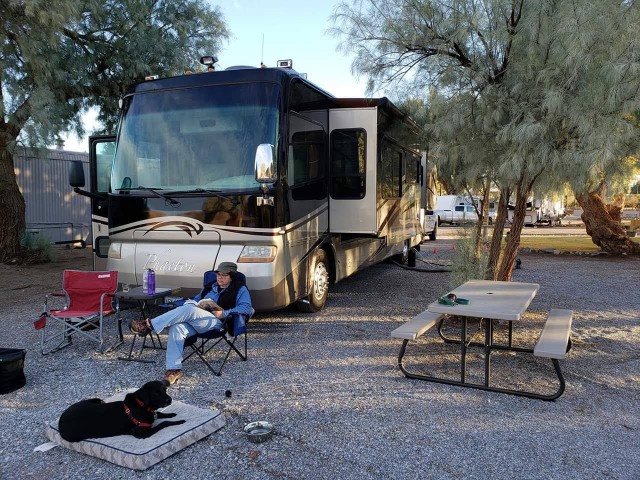
On January 22, 2019 at 4:30PM as we were parked in a RV park in Shoshone, CA, smoke started pouring into our motorhome from a panel under the refrigerator. My wife, our dog, and I all immediately evacuated our beloved Tiffin. Over the next several hours, we battled the fire on our own, waited for the local volunteer fire department to arrive, and watched as our motorhome burned to the ground. We were left only with the clothes on our backs while we were 2500 miles from home. I cannot provide any tips on how you can prevent this from happening to your RV (clearly, I am not a expert on prevention), but I can offer some thoughts about how to mitigate the the impact of such an event.
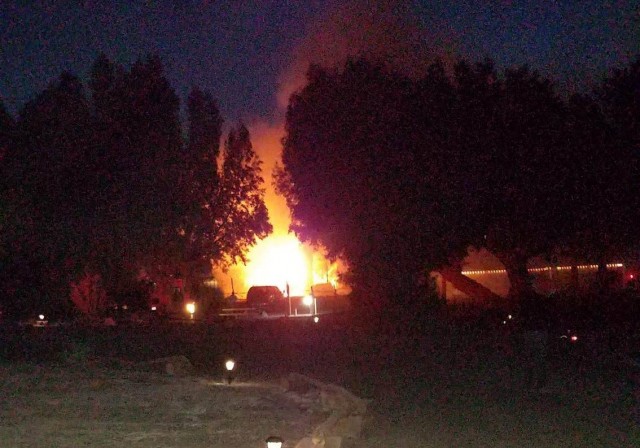
First, if you see smoke, assume that there is a fire and get out immediately. Assume that you are NOT going to get back into your motorhome and take any important items with you (provided that they are within easy reach). I left my phone behind when we left the RV and my wife left her purse and phone. We left the keys to our truck hanging next to the door. Fortunately, I had my wallet in my pocket. But, at the end of the night, my wife had no ID or credit cards, we had no cell phones, and our truck was destroyed because we did not have the keys to start it and move it.
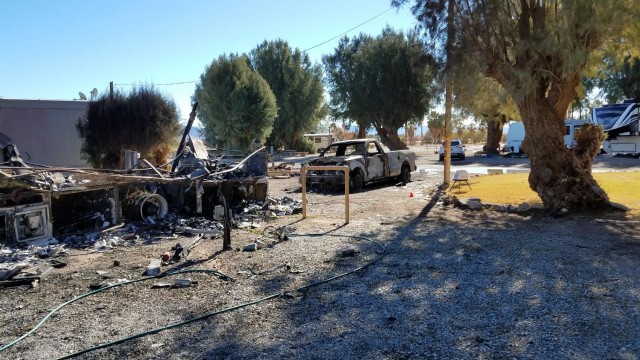
Second, consider keeping a “bug out bag (BOB)” near the exit of your RV. Keep a change of clothes, a couple days of medications, a set of keys to your toad, and some ID and credit cards in the bag. You might even want to make that bag the charging station for your cell phones. The layout of your RV may make keeping a BOB nearby inconvenient or impractical, but I’m sure that you can come up with a solution for your particular circumstance. I sure would have liked access to some of my medications that evening after watching the fire. And a change of clothes would have been nice too.
Third, check your insurance NOW to make sure you have the right coverage. Our insurance company, Erie Insurance, includes assistance to get you home if you have problems while on the road. In our case, they reserved us a rental car while we were on the phone reporting the fire the next morning. (We got what appeared to be the last rental car in Pahrump, NV that morning due to the insurance company’s quick action and existing relationship with the rental car agency.) They paid a significant portion of our expenses home, and have been fantastic in settling the claims. If you carry a large amount of possessions or valuable toys (like bikes, golf carts, or ATVs) make sure they are covered and that they are covered at replacement cost. It pays to shoulder a slightly more expensive premium if the claims experience is good and if you will receive replacement value for your possessions.
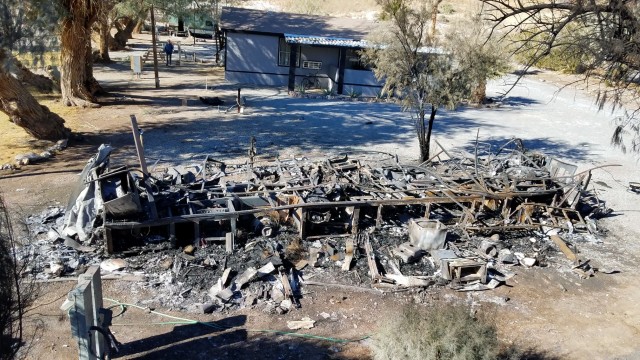
We spent the larger part of 3 weeks detailing the possessions we lost in the fire. We ended up submitting a 60-page list of items. (We drove a 40 foot Class A, so we had lots of space and stuff along for what was a planned 4-month trip.) I don’t have any ideas about how to make this task easier. If you do use a pre-trip checklist or inventory, it might make detailing a loss easier but make sure you keep a copy of the checklist in a safe space (not in your RV).
Lastly, we were lucky that we keep most of our important information in “the cloud”. Once we replaced our phones the day after the fire, we were able to connect to the cloud and recover important account numbers, contacts, documents, and photos. So, make sure that you have accessible off-site backup of important information. Google and Apple have reasonable solutions that make maintaining copies of your data easy.
We are well on the way to finding a replacement for our beloved “King Julian.” We will see you on the road. Stay safe, prepared, and healthy.
— Joe Griffin


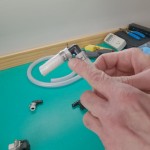
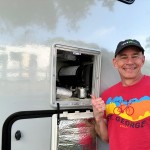
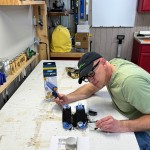
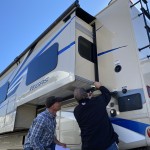





Joe thank you so much – I wish you well in getting back on the road – I’m so grateful you were all safe – I appreciate the thought provoking suggestions
After I bought my used 1999 Holiday Rambler 37WDS pusher and had a new wheelchair lift installed along with the dinette removed to place a twin bed that my disabled mother would use, I started to notice that there are issues with some refrigerator’s ammonia boiler systems leaking vapors and mingling with propane gases during ignition….FIRE!
I was horrified because my mother would be so close to the potential fire threat and we would just not have enough time to get her out of bed, onto her power chair, open the wheelchair lift doors and get hour out of the coach.
That refrigerator was GONE within a couple weeks and replaced with a compressor unit.
Get yours gone, too. They are too risky to own. Maybe even ban them…
I could never live with myself had a fire incident taken place that I knew the risks of and did nothing…
Here here! Another vote for sending absorption refrigerators into the dustbin of RV history!
James and Stef
After reading your article concerning RV fires I have the following recommendation for an upcoming segment for you two to zero in on.
The company name is Fire Fight Products and it is based out of Orlando Florida. (road trip)
They sell fire extinguisher systems for RV’s of any size and for many locations throughout the RV. He has a very interesting story and a great product. Please do your readers a tremendous service and do a spot on his Fire Fight Products. This is an opportunity you may not want to pass up. Please just check it out.
Thank you.
Keep the bug out bag in the trunk of your car (minus the car keys of course). Then you already have it with you if your RV burns down while you’re out running errands. Plus it may come in handy if your car breaks down in the middle of nowhere. I’d also add some non-perishable food (energy bars) and a few water bottles.
Also, put a sign on your RV door if you have pets inside that would need rescuing in the event of an emergency.
I just recently replaced our 2007 absorption refrigerator with a new all-electric NovaKool. (Two scary but small “controlled” fires during troubleshooting.)
But before I got rid of it, I considered an automatic Halon fire extinguisher. Any idea why these aren’t standard equipment?
Joe, taking the time to write this was super generous of you, Thank you — you’ve saved a lot of people plenty of pain and annoyance. I am so very very sorry this happened.
Thank you for posting this. I’m so sorry this happened to Joe and his wife. I am appreciative for the suggestions he has made….they are all excellent ideas. I will be taking this advise for all our future trips!
This is very scary. Glad they made it out safely. We appreciate the helpful information and are going to get working on preparing with these helpful tips!
Thank you all for doing this.
There appears to be some information missing concerning the cause and exact locations of the fire. Fire is a concern for anyone with an RV. We are carrying a mix of highly dangerous fuels onboard. I totally agree that at least three or more properly rated fire extinguishers should be on board. Especially one in the sleeping area as well as in the kitchen. Why are you so sure the refrigerator is the cause. I agree more likely a pure electrical problem. I would like to see James do some articles on safety and safety from fires to add to his other excellent posts
Well, Joe has said in other comments here that there was not enough left of the rig for an insurance expert to make a diagnosis – so any armchair forensics by Joe, myself, or any other reader should be taken for what they are – pure wild guesses.
He’s also said that draining multiple fire extinguishers on the blaze did little to slow it down.
Having said that, Joe said straight off that he was not an expert in prevention, and tried to provide tips on things that would have made his ordeal less traumatic. I think he did that, and did it well, and we’re thankful to him for writing this piece.
Now… you have given me an idea for a future post. But if I were to do it “James Style”, it would involve the local fire department and a donated used RV…
Which might not be as hard to pull off as it seems. You’ve got me thinking!…
James, would love to see a post done James Style concerning this topic as well as see comments from the professional firefighters. What are their concerns about our RVs. I am sure that you can find a subject RV and the fire department I imagine is always looking for training exercises. Hope to see this soon in your style.
This sounds like a classic electrical short caused fire. Your RV should have a master electrical switch or a curcuit breaker panel. At the first sign of smoke or fire, these switch(s) should be turned to the off position. If you’re plugged into a power pedestal, that should also be switched off quickly.
Do you have a fire extinguisher in the house and in the cab? If not, you should have at least two, if not three.
The key to stopping a fire is a quick response. Don’t put your safety at risk, but you can take quick and simple steps to extinguish a fire or stop an electrical short and avoid losing your rig.
Unless it was an absorption fridge, and then I’d blame the refrigerator in an instant.
Either way, I don’t think we have enough to diagnose the problem from just the information given.
Is this a potential hazard with a wired in compression fridge?
Not what I was thinking of.
An absorption fridge, when running on propane, has an actual flame burning inside your RV. The thought of that doesn’t give me warm fuzzies.
A compressor fridge on the other hand, has no such flame, and is – in my opinion – safer.
The fire seems to have started in the inverter. That’s where the initial smoke started. The inverter was mounted right below the fridge, an absorption fridge. I would not be surprised if once the fire started, the fridge contributed to the strength of the flames.
The insurance company dispatched a fire investigator to examine the carcass. He told me that there was not enough left to determine what caused the fire.
I just suffered a horrific loss on 1/2/19. Our RV Norcold refrigerator burnt our 90×100 pole barn down that included 9 classic cars, boat, Harley and my hair salon. Our loss was over a million dollars and we are devastated as it was everything we worked all of life for. I wish I could post pics on here! I feel everyone’s pain and hurt that has experienced this type of tragedy. I can’t not stress enough to check you refrigerator units. I have talked to so many that have checked after I had told them our story and they saw evidence of extreme heat.
Gads!
One more vote for getting rid of absorption refrigeration!
Willie- The fire started in the main fuse panel. My first step was to disconnect at the pedestal. While I was doing that, my wife disconnected the batteries using the master switch. She then turned off the propane.
We had a single fire extinguisher available next to the front door. I used that one and a neighbor camper brought over another. After using both extinguishers, the fire still raged. I also tried to put it out using the water hose. There was a strong wind that day which also contributed to the spread of the fire. We did not stop fighting the fire until it was clear that it was unsafe to be near the rig.
My point is that even with a quick response the fire quickly got out of control so having the right equipment is appropriate but so is planning for mitigating the result of the fire.
This is every RVer’s worst nightmare. So sorry this happened to you, Joe. I really appreciate this write-up! I found it incredibly thought-provoking, and from now on I plan to leave my phone in positions where I can easily grab and dash!